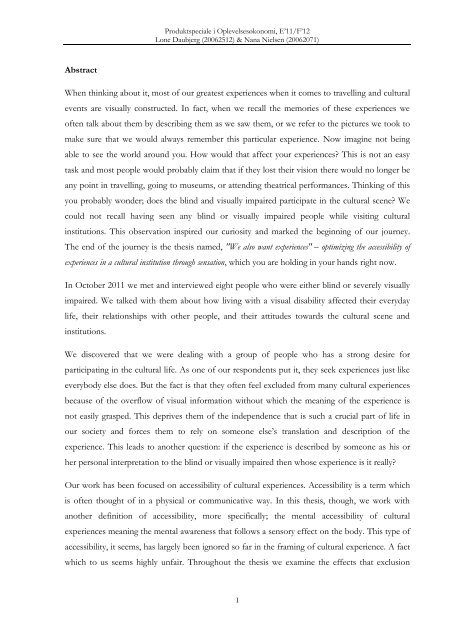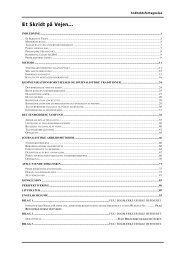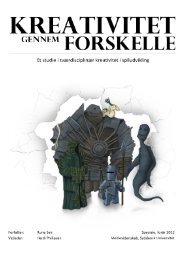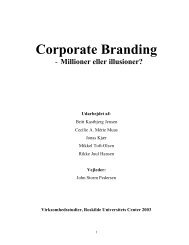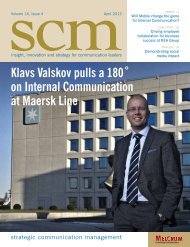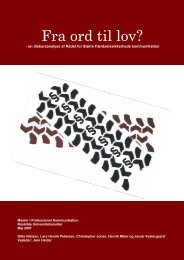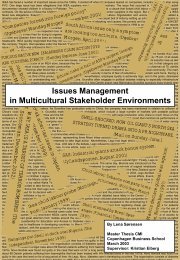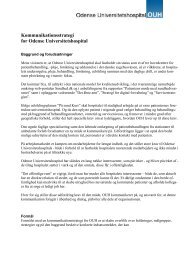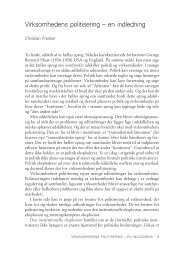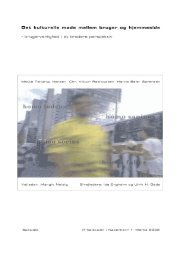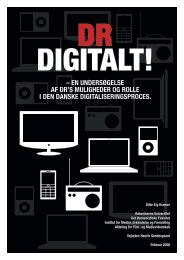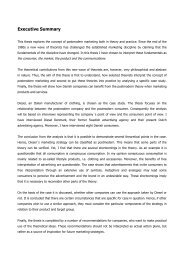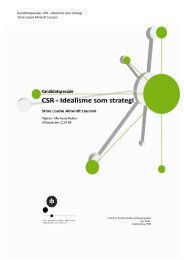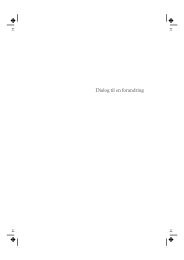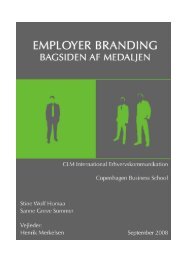Vi vil Mo også gerne have oplevelser ² en optimering af ...
Vi vil Mo også gerne have oplevelser ² en optimering af ...
Vi vil Mo også gerne have oplevelser ² en optimering af ...
Create successful ePaper yourself
Turn your PDF publications into a flip-book with our unique Google optimized e-Paper software.
Abstract<br />
Produktspeciale i Oplevelsesøkonomi, E’11/F’12<br />
Lone Daubjerg (20062512) & Nana Niels<strong>en</strong> (20062071)<br />
Wh<strong>en</strong> thinking about it, most of our greatest experi<strong>en</strong>ces wh<strong>en</strong> it comes to travelling and cultural<br />
ev<strong>en</strong>ts are visually constructed. In fact, wh<strong>en</strong> we recall the memories of these experi<strong>en</strong>ces we<br />
oft<strong>en</strong> talk about them by describing them as we saw them, or we refer to the pictures we took to<br />
make sure that we would always remember this particular experi<strong>en</strong>ce. Now imagine not being<br />
able to see the world around you. How would that <strong>af</strong>fect your experi<strong>en</strong>ces? This is not an easy<br />
task and most people would probably claim that if they lost their vision there would no longer be<br />
any point in travelling, going to museums, or att<strong>en</strong>ding theatrical performances. Thinking of this<br />
you probably wonder; does the blind and visually impaired participate in the cultural sc<strong>en</strong>e? We<br />
could not recall having se<strong>en</strong> any blind or visually impaired people while visiting cultural<br />
institutions. This observation inspired our curiosity and marked the beginning of our journey.<br />
The <strong>en</strong>d of the journey is the thesis named, "We also want experi<strong>en</strong>ces" – optimizing the accessibility of<br />
experi<strong>en</strong>ces in a cultural institution through s<strong>en</strong>sation, which you are holding in your hands right now.<br />
In October 2011 we met and interviewed eight people who were either blind or severely visually<br />
impaired. We talked with them about how living with a visual disability <strong>af</strong>fected their everyday<br />
life, their relationships with other people, and their attitudes towards the cultural sc<strong>en</strong>e and<br />
institutions.<br />
We discovered that we were dealing with a group of people who has a strong desire for<br />
participating in the cultural life. As one of our respond<strong>en</strong>ts put it, they seek experi<strong>en</strong>ces just like<br />
everybody else does. But the fact is that they oft<strong>en</strong> feel excluded from many cultural experi<strong>en</strong>ces<br />
because of the overflow of visual information without which the meaning of the experi<strong>en</strong>ce is<br />
not easily grasped. This deprives them of the indep<strong>en</strong>d<strong>en</strong>ce that is such a crucial part of life in<br />
our society and forces them to rely on someone else’s translation and description of the<br />
experi<strong>en</strong>ce. This leads to another question: if the experi<strong>en</strong>ce is described by someone as his or<br />
her personal interpretation to the blind or visually impaired th<strong>en</strong> whose experi<strong>en</strong>ce is it really?<br />
Our work has be<strong>en</strong> focused on accessibility of cultural experi<strong>en</strong>ces. Accessibility is a term which<br />
is oft<strong>en</strong> thought of in a physical or communicative way. In this thesis, though, we work with<br />
another definition of accessibility, more specifically; the m<strong>en</strong>tal accessibility of cultural<br />
experi<strong>en</strong>ces meaning the m<strong>en</strong>tal awar<strong>en</strong>ess that follows a s<strong>en</strong>sory effect on the body. This type of<br />
accessibility, it seems, has largely be<strong>en</strong> ignored so far in the framing of cultural experi<strong>en</strong>ce. A fact<br />
which to us seems highly unfair. Throughout the thesis we examine the effects that exclusion<br />
I


